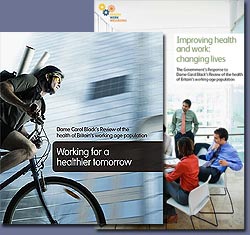 |
 |
|
Concern Over Government Replacement Of Sick Note With Fit Note The introduction of the ‘fit note’ forms part of the Government’s response to Dame Carol Black’s groundbreaking report into the health of Britain’s working age population, which was published in March 2008. A consultation period will run for twelve weeks, beginning on 28 May 2009 and ending on 19 August 2009. Interestingly the DWP press release talks of ending Britain's "Sick note culture" which is clearly the CBI view of things, and and goes on to say: A new medical ‘fit note’ to replace the current ‘sick note’ and help more people stay in work rather than drift into long term sickness is unveiled today along with a twelve week consultation on its design. The new ‘fit note’ will enable people to get the best possible advice about staying in work, and if they can’t work what their employer can do to help them return to work sooner. For example, if the employee has a problem with mobility, suggesting a job where they can work sitting down rather than standing up.
“Employers tell us that managing sickness absence can be a challenge. This is compounded by a ‘sick note’ system that makes sickness absence a black and white issue – either you are unfit for work or you are not. The Health Minister Ben Bradshaw also backed the move saying: Despite the statement that " the new ‘fit notes’ will roll-out across Great Britain in the Spring of 2010" and where "developed with the support of healthcare professionals, employer representatives and trade unions."; the TUC has expressed concerns. TUC General Secretary Brendan Barber said last week: "The TUC agrees that more needs to be done to help those off sick to return to work. In some cases a phased or a supported return may help speed up the process of an ill or injured worker getting back to work. But there are many circumstances where an early return can prevent the worker making a full recovery, or even lead to a relapse. Most employers won't have the expertise to give workers the support they need for an early return and this could make matters worse. There is also a danger that because of the proposed changes, the sick note process will become a dialogue between the GP and the employer, and workers may feel they are being forced back to work. The most effective way of encouraging workers back to work is through access to proper occupational health support." Furthermore the move to automate all of this by making the new fit note "computer-generated in GPs surgeries, replacing the current hand written version.", the Government continues down the road of one solution fits all circumstances, and removing human medical expertise just in the same way it already has done with benefit medical assessments being conducted by private companies with laptop based 'tick box' questionnaires in deciding a person's individual capacity and suitability for benefits. Seldom does this process include a true medical examination. The fear many have is that the introduction of such a system into GP surgeries will only increase the number of people unfit for work being forced into remaining at work and this could end up costing far more to the country as a result of workers health being made worse. Adding to such concerns, this weeks TUC Risks comments: "Workplace health campaigners have raised concerns about the ability of GPs to make judgments about what work a patient may be able to undertake when the medics have no knowledge of a workplace or a job and little training in occupational health. There are also concerns that discussions between employers and GPs may breach medical confidentiality. And while the government says the measures are intended to address a 'sick note culture', research has shown there is no such culture at work. Instead, workers fearing for their jobs are trooping in while unwell." Union Safety Reps wishing to involve themselves in the consultation period (28 May 2009 to 19 August 2009) should download the consultation document below and send their comments in to the address provided on page 5 of the document within the above deadlines. Download: Reforming the Medical Statement: Consultation on Draft Regulations May 2009 Download: Dame Carol Black's Report here and also other related documents from the E-Libary here Source: DWP / TUC / Risks
|
 Whilst, Lord Bill McKenzie, Work and Pensions Minister, said:
Whilst, Lord Bill McKenzie, Work and Pensions Minister, said: